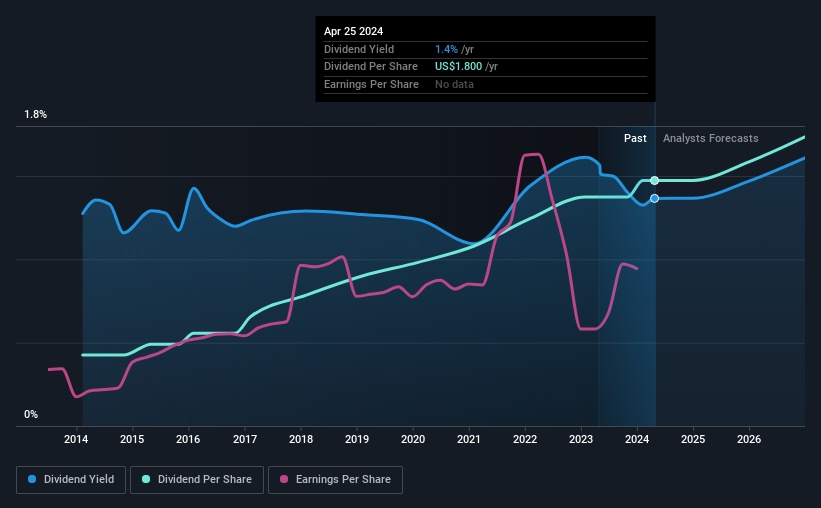Intercontinental Exchange (NYSE:ICE) Has Announced A Dividend Of $0.45
Intercontinental Exchange, Inc. (NYSE:ICE) will pay a dividend of $0.45 on the 28th of June. This takes the annual payment to 1.4% of the current stock price, which unfortunately is below what the industry is paying.
Check out our latest analysis for Intercontinental Exchange
Intercontinental Exchange's Dividend Is Well Covered By Earnings
The dividend yield is a little bit low, but sustainability of the payments is also an important part of evaluating an income stock. Based on the last payment, Intercontinental Exchange was quite comfortably earning enough to cover the dividend. This means that a large portion of its earnings are being retained to grow the business.
Over the next year, EPS is forecast to expand by 42.5%. Assuming the dividend continues along recent trends, we think the payout ratio could be 34% by next year, which is in a pretty sustainable range.
Intercontinental Exchange Has A Solid Track Record
Even over a long history of paying dividends, the company's distributions have been remarkably stable. Since 2014, the annual payment back then was $0.52, compared to the most recent full-year payment of $1.80. This means that it has been growing its distributions at 13% per annum over that time. We can see that payments have shown some very nice upward momentum without faltering, which provides some reassurance that future payments will also be reliable.
Dividend Growth May Be Hard To Achieve
Investors could be attracted to the stock based on the quality of its payment history. Earnings have grown at around 3.6% a year for the past five years, which isn't massive but still better than seeing them shrink. Growth of 3.6% per annum is not particularly high, which might explain why the company is paying out a higher proportion of earnings. While this isn't necessarily a negative, it definitely signals that dividend growth could be constrained in the future unless earnings start to pick up again.
Intercontinental Exchange Looks Like A Great Dividend Stock
In summary, it is always positive to see the dividend being increased, and we are particularly pleased with its overall sustainability. Distributions are quite easily covered by earnings, which are also being converted to cash flows. All of these factors considered, we think this has solid potential as a dividend stock.
Market movements attest to how highly valued a consistent dividend policy is compared to one which is more unpredictable. However, there are other things to consider for investors when analysing stock performance. Just as an example, we've come across 2 warning signs for Intercontinental Exchange you should be aware of, and 1 of them is concerning. If you are a dividend investor, you might also want to look at our curated list of high yield dividend stocks.
Have feedback on this article? Concerned about the content? Get in touch with us directly. Alternatively, email editorial-team (at) simplywallst.com.
This article by Simply Wall St is general in nature. We provide commentary based on historical data and analyst forecasts only using an unbiased methodology and our articles are not intended to be financial advice. It does not constitute a recommendation to buy or sell any stock, and does not take account of your objectives, or your financial situation. We aim to bring you long-term focused analysis driven by fundamental data. Note that our analysis may not factor in the latest price-sensitive company announcements or qualitative material. Simply Wall St has no position in any stocks mentioned.

 Yahoo Finance
Yahoo Finance 
